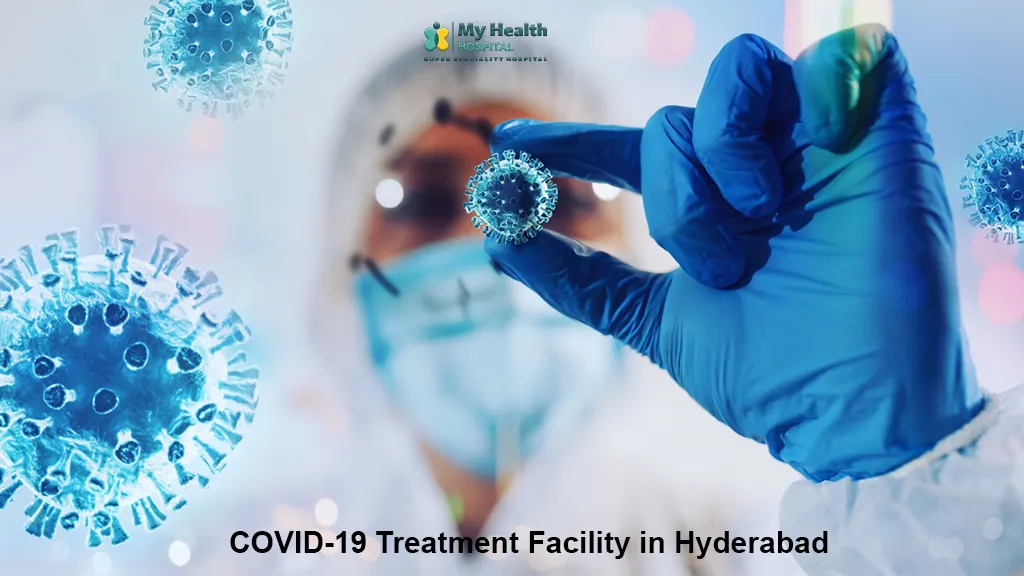-
 Mail us
Mail usinfo@myhealthhospitals.com
-
 Toll Free
Toll Free+91 9111674111
- Book Appointment
Covid-19
Over the past few weeks in Tarnaka, Hyderabad, the number of COVID-19 infections has started to rise again. After months of relative calm, new sub-variants and relaxed public health measures have combined to push active cases upward. This article explains the factors behind the surge in Tarnaka, outlines the latest numbers, and offers practical advice on prevention, testing, treatment, and staying safe at your local COVID treatment facility hospitals in Tarnaka.

If you develop symptoms or have close contact with a confirmed case, schedule an RT-PCR test within 3–5 days of exposure. Rapid antigen tests offer same-day results but are less sensitive—follow up with PCR if needed.
Although vaccines and prior infections have reduced severe outcomes, the virus continues to circulate. Key precautions for Tarnaka residents:
Wear a well-fitting surgical or N95/KN95 mask in crowded indoor settings, including your local COVID treatment facility hospitals in Tarnaka if you must visit.
Open windows or use exhaust fans at home and work. Portable HEPA air purifiers add protection.
Wash hands with soap and water for ≥ 20 seconds or use ≥ 60 % alcohol sanitizer.
Maintain at least one metre (three feet) from people outside your household.
If you test positive, isolate for at least five days and wear a mask around others until you have two negative tests 24 hours apart.
No mandatory testing or vaccination proofs for trains/flights, but masks are still required on many carriers.
Follow your destination’s rules—some require a negative test within 48–72 hours or proof of vaccination.
High-risk workplaces (healthcare, manufacturing) may reinstate mask mandates and regular testing.
Institutions can use random testing, improve ventilation, and encourage masks during surges.
To avoid misinformation, rely on authoritative resources:
COVID-19 remains a public health concern in Tarnaka, Hyderabad. By keeping up with latest trends, staying current on vaccinations, and following simple preventive measures—especially when visiting any COVID treatment facility hospital in Tarnaka—you can protect yourself and your loved ones. For symptoms or concerns, contact your healthcare provider without delay.
Stay informed. Stay safe.
Current data indicate similar or milder illness compared to BA.5, with no spike in hospitalizations.
Yes—breakthrough infections can occur, and asymptomatic individuals may still transmit the virus.
Protection against severe disease lasts at least six months; protection against mild infection wanes sooner.
A same-day rapid antigen test can reduce the chance of unknowingly spreading the virus.
If you test positive, self-isolate, monitor your symptoms, and follow medical advice. For moderate to severe symptoms, seek admission to a COVID-19 facility like My Health Hospitals for proper care and monitoring.
Yes, My Health Hospitals Hyderabad offers 24/7 COVID-19 emergency care, ICU facilities, oxygen support, and doctor consultations to handle all cases round the clock.
Post-COVID symptoms include fatigue, breathlessness, brain fog, and chest pain. My Health Hospitals provides specialized post-COVID care programs to help patients fully recover.
To prevent COVID-19: wear a mask, maintain social distancing, wash hands regularly, avoid crowds, and get vaccinated. These steps are essential to reduce the spread of the virus in Hyderabad.
Not always. Mild cases can often be managed at home with proper monitoring and rest. My Health Hospitals offers home care guidance and teleconsultations to help manage mild COVID-19 cases safely.
Yes, we provide vaccination counseling and help patients understand which COVID-19 vaccine is right for them based on age, health status, and medical history. Contact us for updated vaccine availability.
Visit any of our My Health Hospitals branches for advanced medical care and expert consultations.
H.No 15-24-212, MIG-212, Rd Number 1, K P H B Phase 1, Kukatpally, Hyderabad, Telangana 500072
H.No:-12-5-30, WhiteHouse, Moula Ali Rd, South Lalaguda, Tarnaka, Secunderabad, Telangana 500017